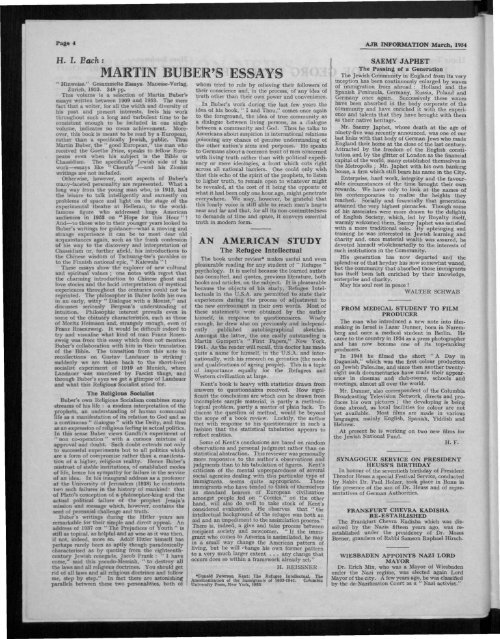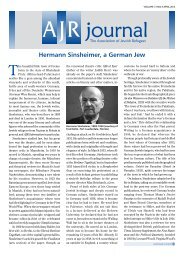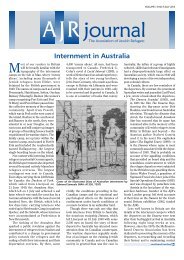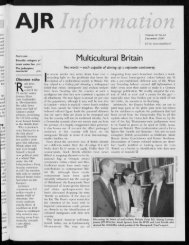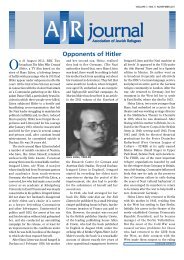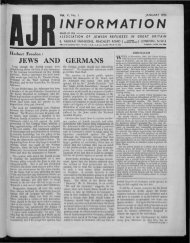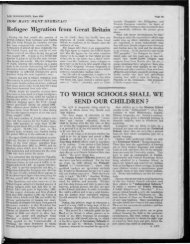our surnames (ii) - The Association of Jewish Refugees
our surnames (ii) - The Association of Jewish Refugees
our surnames (ii) - The Association of Jewish Refugees
You also want an ePaper? Increase the reach of your titles
YUMPU automatically turns print PDFs into web optimized ePapers that Google loves.
iraiHB<br />
••• lOMi'i^-^^'^^^^^'*^^^^''^''.<br />
Pag« 4 AJR INFORMATION March, 1954<br />
H. I. Each:<br />
MARTIN EUBER'S ESSAYS<br />
" Hinweise." Gesammelte Essays. Manesse-Verlag,<br />
Zurich, 1953. 348 pp.<br />
This volume is a selection <strong>of</strong> Martin Buber'.«<br />
essays written between 1909 and 1953. <strong>The</strong> mere<br />
fact that a writer, for all the width and diversity <strong>of</strong><br />
his past and present interests, feels his work<br />
throughout such a long and turbulent time to be<br />
consistent enough to be included in one single<br />
volume, indicates no mean achievement. Moreover,<br />
this book is meant to be read by a European,<br />
rather than a specifically <strong>Jewish</strong>, public. Thus<br />
Martin Buber, the " good European," the man who<br />
received the Goethe Prize, speaks to fellow Europeans<br />
even when his subject is the Bible or<br />
Chassidism. <strong>The</strong> specifically <strong>Jewish</strong> side <strong>of</strong> his<br />
work—essays like " Cheruth "—and his Zionist<br />
writings are not included.<br />
Otherwise, however, most aspects <strong>of</strong> Buber's<br />
many-faceted personality are represented. What a<br />
long way from the young man who, in 1913, had<br />
the leisure to talk intelligently and earnestly on<br />
problems <strong>of</strong> space and light on the stage <strong>of</strong> the<br />
experimental theatre at Hellerau, to the worldfamous<br />
figure who addressed huge American<br />
audiences in 1953 on " Hope for this H<strong>our</strong> " !<br />
And—to those who in their younger years looked to<br />
Buber's writings for guidance—what a moving and<br />
strange experience it can be to meet dear old<br />
acquaintances again, such as the frank confession<br />
<strong>of</strong> his way to the discovery and interpretation <strong>of</strong><br />
Chassidism or, further afield, his introductions to<br />
the Chinese wisdom <strong>of</strong> Tschuang-tse's parables or<br />
to the Finnish national epic, " Kalewala " !<br />
<strong>The</strong>se essays show the explorer <strong>of</strong> new cultural<br />
and spiritual values ; one notes with regret that<br />
the charming introduction to Chinese ghost and<br />
love stories and the lucid interpretation <strong>of</strong> mystical<br />
experiences throughout the centuries could not be<br />
reprinted. <strong>The</strong> philosopher in Buber holds his own<br />
in an early, witty " Dialogue with a Monist," and<br />
discusses seriously Bergson's understanding <strong>of</strong><br />
intuition. Philosophic interest prevails even in<br />
some <strong>of</strong> the obituary characteristics, such as those<br />
<strong>of</strong> Moritz Heimann and, strangely enough, even <strong>of</strong><br />
Franz Rosenzweig. It would be difficult indeed to<br />
try and visualise what kind <strong>of</strong> man Franz Rosenzweig<br />
was from this essay which does not mention<br />
Buber's collaboration with him in their translation<br />
<strong>of</strong> the Bible. <strong>The</strong> transition from this note to<br />
recollections on Gustav Landauer is striking :<br />
suddenly we are taken back to the short-lived<br />
socialist experiment <strong>of</strong> 1919 at Munich, where<br />
Landauer was murdered by Fascist thugs, and<br />
through Buber's eyes we get a glimpse <strong>of</strong> Landauer<br />
and what this Religious Socialist stood for.<br />
<strong>The</strong> Religious Socialist<br />
Buber's own Religious Socialism combines many<br />
streams <strong>of</strong> his life : a modem interpretation <strong>of</strong> the<br />
prophets, an understanding <strong>of</strong> human communal<br />
fife as a manifestation <strong>of</strong> its relation to God and as<br />
a continuous " dialogue " with the Deity, and thus<br />
as an expression <strong>of</strong> religious feeling in actual politics.<br />
In this sense Buber views Gandhi's experiment <strong>of</strong><br />
" non co-operation " with a curious mixture <strong>of</strong><br />
approval and doubt. Such doubt extends not only<br />
to successful experiments but to all politics which<br />
are a form <strong>of</strong> compromise rather than a manifestation<br />
<strong>of</strong> a higher, religious reality. Hence Buber's<br />
mistrust <strong>of</strong> stable institutions, <strong>of</strong> established modes<br />
<strong>of</strong> life, hence his sympathy for failure in the service<br />
<strong>of</strong> an idea. In his inaugural address as a pr<strong>of</strong>essor<br />
at the University <strong>of</strong> Jerusalem (1938) he contrasts<br />
two such failures in the history <strong>of</strong> mankind: that<br />
<strong>of</strong> Plato's conception <strong>of</strong> a philosopher-king and the<br />
actual political failure <strong>of</strong> the prophet Jesaja's<br />
mission and message which, however, contains the<br />
seed <strong>of</strong> perennial challenge and truth.<br />
Buber's writings during the Hitler years are<br />
remarkable for their simple and direct appeal. An<br />
address <strong>of</strong> 1937 on " <strong>The</strong> Prejudices <strong>of</strong> Youth " is<br />
still as topical, as helpful and as wise EIS it wjis then,<br />
if not, indeed, more so. Adolf Hitler himself has<br />
perhaps rarely been as aptly though paradoxically<br />
characterised as by quoting from the eighteenthcentury<br />
<strong>Jewish</strong> renegade, Jacob Frank : " I have<br />
come," said this pseudo-Messiah, " to destroy all<br />
the laws and all religious doctrines. You should get<br />
rid <strong>of</strong> all laws and all religious doctrines and follow<br />
me, step by step." In fact there are astonishing<br />
parallels between these two personalities, both <strong>of</strong><br />
whom tried to rule by relieving their followers <strong>of</strong><br />
their conscience and, in the process, <strong>of</strong> any idea <strong>of</strong><br />
truth other than their own power and convenience.<br />
In Buber's work during the last few years the<br />
idea <strong>of</strong> his book, " I and Thou," comes once again<br />
to the foreground, the idea <strong>of</strong> true community as<br />
a dialogue between living persons, as a dialogue<br />
between a community and God. Thus he talks to<br />
Americans about suspicion in international relations<br />
poisoning any chance <strong>of</strong> genuine understanding <strong>of</strong><br />
the other nation's aims and purposes. He speaks<br />
to Germans about a common front <strong>of</strong> men concerned<br />
with living truth rather than with political expediency<br />
or mere ideologies, a front which cuts right<br />
across all national barriers. One could only wish<br />
that this echo <strong>of</strong> the spirit <strong>of</strong> the prophets, to listen<br />
to higher truth, to remain open to whatever might<br />
be revealed, at the cost <strong>of</strong> it being the opposite <strong>of</strong><br />
what it had been only one h<strong>our</strong> ago, might penetrate<br />
everywhere. We may, however, be grateful that<br />
this lonely voice is still able to reach men's hearts<br />
near and far and that, for all its non-committedness<br />
to demands <strong>of</strong> time and space, it conveys essential<br />
truth in modern form.<br />
AN AMERICAN STUDY<br />
<strong>The</strong> Refugee Intellectual<br />
<strong>The</strong> book under review* makes useful and even<br />
pleasurable reading for any student <strong>of</strong> " Refugee "<br />
psychology. It is useful because the learned author<br />
has consulted, and quotes, previous literature, both<br />
books and articles, on the subject. It is pleasurable<br />
because the objects <strong>of</strong> his study. Refugee Intellectuals<br />
in the U.S.A. are permitted to state their<br />
experiences during the process <strong>of</strong> adjustment to<br />
the new environment in their own words. Most <strong>of</strong><br />
these statements were obtained by the author<br />
himself, in response to questionnaires. Wisely<br />
enough, he drew also on previously and independently<br />
published autobiographical sketches.<br />
Amongst the latter, the one easily outstanding is<br />
Martin Gumpert's " First Papers," New York,<br />
1941. As the reader will recall, this doctor has made<br />
quite a name for himself, in the U.S.A. and internationally,<br />
with his research on gerontics (the needs<br />
and qualifications <strong>of</strong> ageing people). This is a topic<br />
<strong>of</strong> importance equally for the <strong>Refugees</strong> and<br />
Western civilization at large.<br />
Kent's book is heavy with statistics drawn from<br />
answers to questionnaires received. How significant<br />
the conclusions are which can be drawn from<br />
incomplete sample material, is partly a methodological<br />
problem, partly a matter <strong>of</strong> plain luck. To<br />
discuss the question <strong>of</strong> method, would be beyond<br />
the scope <strong>of</strong> a book review. Luckily, the author<br />
met with response to his questionnaire in such a<br />
fashion that the statistical tabulation appears to<br />
reflect realities.<br />
Some <strong>of</strong> Kent's conclusions are based on random<br />
observations and personal judgment rather than on<br />
statistical abstraction. This reviewer was personally<br />
more responsive to the author's observations and<br />
judgments than to his tabulation <strong>of</strong> figures. Kent's<br />
criticism <strong>of</strong> the mental unpreparedness <strong>of</strong> several<br />
social agencies dealing with this particular type <strong>of</strong><br />
immigrants, seems quite appropriate. Those<br />
immigrants who have tended to think <strong>of</strong> themselves<br />
as standard bearers <strong>of</strong> European civilization<br />
amongst people fed on " Comics," on the other<br />
hand, will also do well to take stock <strong>of</strong> Kent's<br />
considered evaluation. He observes that " the<br />
intellectual background <strong>of</strong> the refugee was both an<br />
aid and an impediment to the assimilation process."<br />
<strong>The</strong>re is, indeed, a give and take process between<br />
recipient society and newcomer. " If the immigrant<br />
who comes to America is assimilated, he may<br />
in a small way change the American pattern <strong>of</strong><br />
living, but he will ihange his own former pattern<br />
to a very much larger extent . . . any change that<br />
occurs does so within a framework already set."<br />
H. REISSNER<br />
•Donald Peterson Kent: <strong>The</strong> Refugee Intellectual. <strong>The</strong><br />
Americanization <strong>of</strong> the Immigrants <strong>of</strong> I933-I941. Columbia<br />
University Press, New Yorli, 1953<br />
SAEMY JAPHET<br />
<strong>The</strong> Passing <strong>of</strong> a Generation<br />
<strong>The</strong> <strong>Jewish</strong> Community in England from its very<br />
inception has been continuously enlarged by waves<br />
<strong>of</strong> immigration from abroad : Holland and the<br />
Spanish Peninsula, Germany, Russia, Poland and<br />
Germany once again. Successively these waves<br />
have been absorbed in the body corporate <strong>of</strong> the<br />
community and have enriched it with the experience<br />
and talents that they have brought with them<br />
as their native heritage.<br />
Mr. Saemy Japhet, whose death at the age <strong>of</strong><br />
ninety-five was recently announced, was one <strong>of</strong> <strong>our</strong><br />
last links with that body <strong>of</strong> German Jews who made<br />
England their home at the close <strong>of</strong> the last century.<br />
Attracted by the freedom <strong>of</strong> the English constitution<br />
and by the glitter <strong>of</strong> London as the financial<br />
capital <strong>of</strong> the world, many established themselves in<br />
the Metropolis ; Mr. Japhet with his own banking<br />
house, a firm which still bears his name in the City.<br />
Enterprise, hard work, integrity and the fav<strong>our</strong>able<br />
circumstances <strong>of</strong> the time brought their own<br />
rewards. We have only to look at the names <strong>of</strong><br />
his contemporaries to realise the heights they<br />
reached. .Socially and financially that generation<br />
attained the very highest pinnacles. Though some<br />
<strong>of</strong> his associates were more drawn to the delights<br />
<strong>of</strong> English Society, which, led by Royalty itself,<br />
warmly welcomed them, Saemy Japhet was satisfied<br />
with a more traditional role. By upbringing and<br />
training he was interested in <strong>Jewish</strong> learning and<br />
charity and, once material wealth was assured, he<br />
devoted himself wholeheartedly to the interests <strong>of</strong><br />
such institutions in the Community.<br />
His generation has now departed and the<br />
splend<strong>our</strong> <strong>of</strong> that heyday has now somewhat waned,<br />
but the community that absorbed those immigrants<br />
has itself been left enriched by their knowledge,<br />
enterprise and charity.<br />
May his soul rest in peace !<br />
WALTER SCHWAB<br />
FROM MEDICAL STUDENT TO FILM<br />
PRODUCER<br />
<strong>The</strong> man who introduced a new note into filmmaking<br />
in Israel is Lazar Dunner, born in Nuremberg<br />
and once a medical student in Berlin. He<br />
came to the country in 1934 as a press photographer<br />
and has now become one <strong>of</strong> its top-ranking<br />
producers.<br />
In 1948 he filmed the short " A Day in<br />
Daganiah," which was the first col<strong>our</strong> production<br />
on <strong>Jewish</strong> Palestine, and since then another twentyeight<br />
such documentaries have made their appearance<br />
in cinemas and club-rooms, schools and<br />
meetings, almost all over the world.<br />
Mr. Dunner, also correspondent <strong>of</strong> the Columbia<br />
Broadcasting Television Network, directs and produces<br />
his own pictures ; the developing is being<br />
done abroad, as local facilities for col<strong>our</strong> are not<br />
yet available. Most films are made in various<br />
languages, mainly English, Spanish, Yiddish and<br />
Hebrew.<br />
At present he is working on two new fUms for<br />
the <strong>Jewish</strong> National Fund.<br />
H. F.<br />
SYNAGOGUE SERVICE ON PRESIDENT<br />
HEUSS'S BIRTHDAY<br />
In hon<strong>our</strong> <strong>of</strong> the seventieth birthday <strong>of</strong> President<br />
<strong>The</strong>odor Heuss a special Festival Service, conducted<br />
by Rabbi Dr. Paul Holzer, took place in Boim in<br />
the presence <strong>of</strong> the son <strong>of</strong> Dr. Heuss and <strong>of</strong> representatives<br />
<strong>of</strong> German Authorities.<br />
FRANKFURT CHEVRA KADISHA<br />
RE-ESTABLISHED<br />
<strong>The</strong> Frankfurt Chevra Kadisha which was dissolved<br />
by the Nazis fifteen years ago, was reestablished<br />
under the presidency <strong>of</strong> Dr. Moses<br />
Breuer, grandson <strong>of</strong> Rabbi Samson Raphael Hirsch.<br />
WIESBADEN APPOINTS NAZI LORD<br />
MAYOR<br />
Dr. Erich Mix, who was a Mayor <strong>of</strong> Wiesbaden<br />
under the Nazi regime, was elected again Lord<br />
Mayor <strong>of</strong> the city. A few years ago, he was classified<br />
by the de-Nazification C<strong>our</strong>t as a " Nazi activist."


